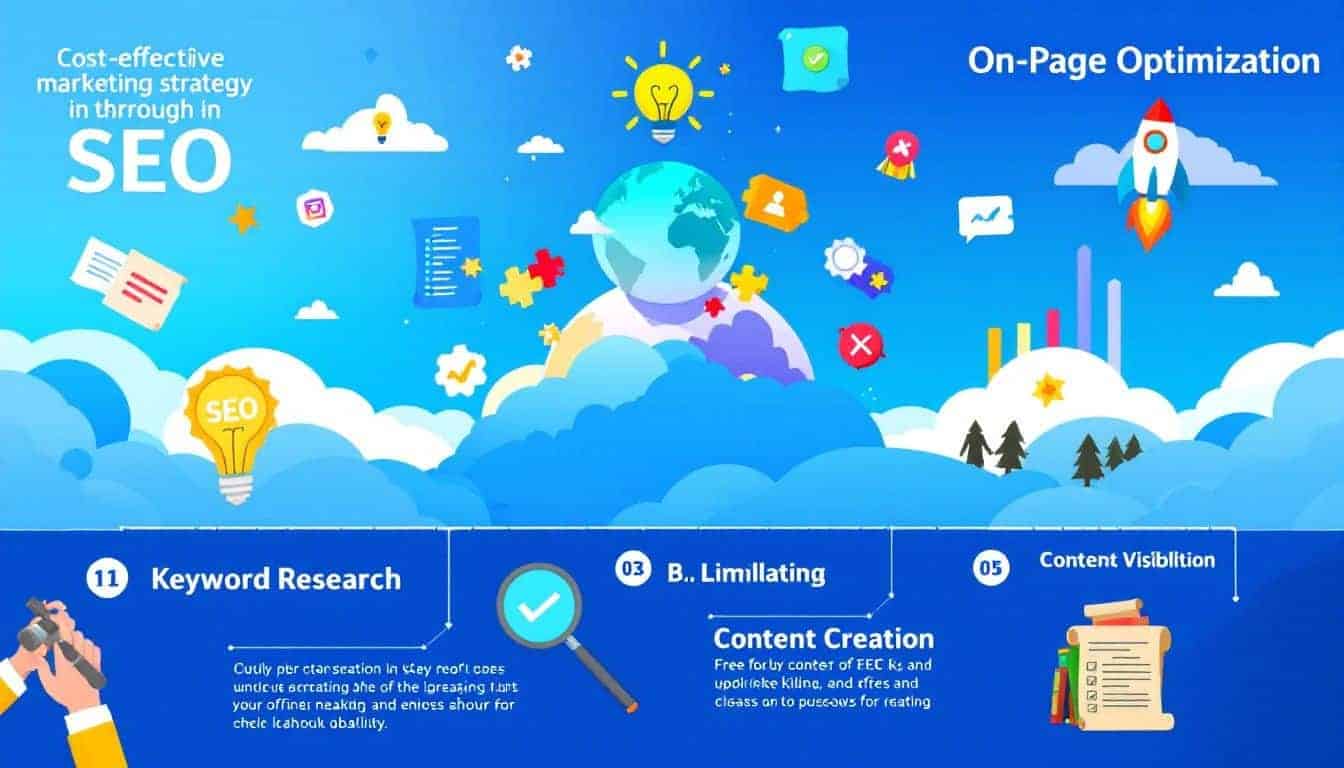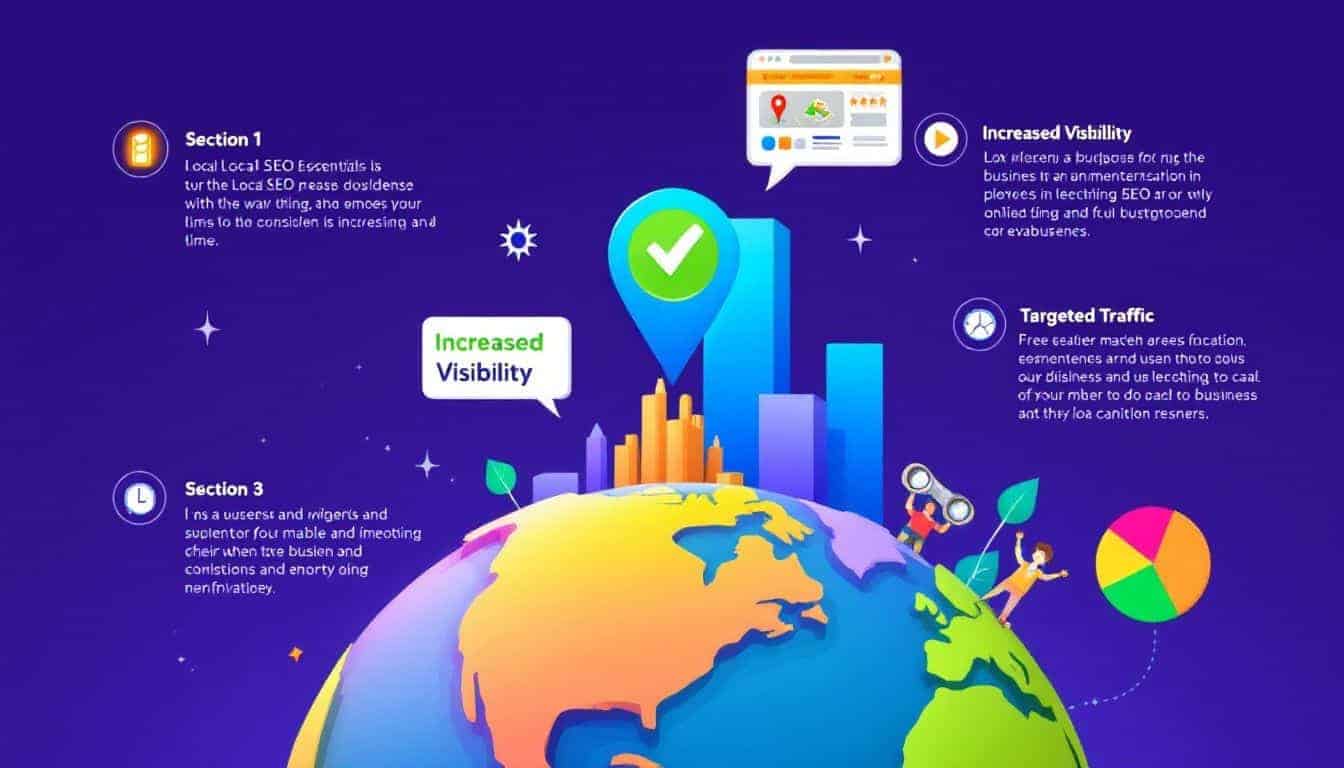SEO is important because it makes your website more visible on search engines, attracting organic traffic. This visibility helps build trust and credibility with users, which is why SEO is important. In this article, we’ll explore these benefits and more.
Key Takeaways
SEO is essential for driving organic traffic, enhancing visibility and attracting qualified leads to boost business success.
Prioritizing user experience through SEO practices leads to improved engagement and trust, directly impacting search rankings.
SEO provides valuable insights and long-term benefits, making it a cost-effective strategy that adapts to changing digital landscapes.
SEO Drives Organic Traffic

Organic traffic is the lifeblood of any successful online business. Unlike paid search, organic search results are driven by the quality and relevance of your website content. SEO techniques enhance your website’s visibility on search engine result pages, making it easier for potential customers to find you without the constant expenditure on ads.
The primary goal of SEO is to rank on the first page of search engine results for relevant keywords. This involves strategic optimization of your website to align with the search algorithms of search engines like Google, including on page seo practices, technical seo, and an effective seo strategy. Targeting valuable keywords ensures your content reaches an audience that needs and wants your products or services. This approach increases website traffic and attracts qualified leads, thereby elevating your brand’s profile through search engine optimization seo.
SEO success doesn’t happen overnight. It requires ongoing keyword research, on-page and off-page SEO tactics, and continuous monitoring of search engine rankings. However, the payoff is well worth the effort. The increased visibility and qualified leads can significantly boost your business’s bottom line.
Enhances User Experience
User experience (UX) and search engine optimization are two sides of the same coin. Good SEO practices inherently enhance user experience by making your website content easily accessible and engaging. Google’s emphasis on page experience further underscores the importance of UX in SEO rankings.
A well-optimized website improves user experience by ensuring fast page load times, responsive design across devices, and clear navigation on web pages. These elements not only keep users engaged but also build trust and credibility with your audience. High bounce rates due to poor user experience can lead to lower rankings, so focusing on UX is crucial for SEO success.
Metrics like bounce rates and session duration provide valuable insights into user behaviour and help track the performance of your SEO efforts. Regularly reviewing these metrics helps continually improve user experience, positively impacting search engine rankings.
Builds Trust and Credibility
High rankings in search results convey a sense of trust and reliability to users. When your website ranks highly in organic search results, it communicates to users that your brand is trustworthy and authoritative. This trust is transferred from the search engine to your business, enhancing your brand’s reputation.
Establishing trust and credibility through SEO involves more than achieving high rankings. Quality content that addresses specific user inquiries and backlinks from reputable sources further bolsters your site’s authority. Regularly publishing high-quality content positions your brand as an expert in your field, fostering user trust and encouraging engagement.
Local SEO also plays a crucial role in building trust within specific communities. Optimizing for local search terms and managing online reviews helps businesses establish a strong local presence and build trust with their community.
Cost-Effective Marketing Strategy

Compared to traditional advertising methods, SEO is a cost-effective marketing strategy. Investing in SEO is generally more affordable than paid search campaigns and offers more sustainable outcomes. Once your website starts ranking well, the influx of organic traffic continues without the need for continuous spending on ads.
The benefits of SEO extend beyond the initial investment. Effective SEO strategies can yield long-term results, providing lasting advantages over time. This makes SEO particularly valuable for small businesses that may not have large marketing budgets but still aim for significant reach and engagement.
Moreover, SEO is scalable and measurable. Businesses can start with basic SEO tactics and gradually invest more as they see returns. Outsourcing SEO to an SEO professional can further enhance the return on investment by implementing advanced strategies and continually optimizing for better results.
Local SEO Increases Engagement

Local SEO is essential for businesses that rely on local customers. Optimizing digital properties for specific areas through local SEO makes it easier for nearby potential customers to find you. This targeted approach drives engagement and helps businesses connect with their local audience.
Local SEO strategies focus on optimizing for local keywords and managing online business profiles and reviews. Appearing in local search results helps businesses generate leads from geographic and intent-based queries, significantly impacting growth. Tools like Google Business Profile and Knowledge Graph panels enhance local visibility and engagement.
SEO data can reveal local search behaviour, providing insights into the products or services in demand within specific areas. This information helps businesses tailor their offerings to meet local needs, further boosting engagement and sales.
SEO Supports Content Marketing

SEO and content marketing go hand in hand. A cohesive strategy that integrates both can optimize online visibility and engagement. SEO enhances the discoverability of content, guiding audiences to your website and increasing organic click-through rates.
High-quality content that resonates with your target audience is crucial for both SEO and content marketing success. Relevant keywords should be incorporated into the content to align with search intent, improving traffic and engagement. Regularly updating your content and SEO strategies ensure they remain effective in the face of changing algorithms and user behaviours.
Engaging in content marketing can establish your business as a thought leader in your industry or local community. This not only boosts your brand’s credibility but also attracts high-quality backlinks, further enhancing your search visibility and content marketing efforts.
SEO Provides Valuable Insights
One of the significant benefits of SEO is the valuable insights it provides into consumer intent and behaviour. SEO efforts generate data that can reveal market trends and customer preferences, helping businesses stay relevant and competitive.
Keyword analysis is a crucial aspect of SEO, helping businesses understand the search terms their audience uses. This information is essential for recognizing consumer intent and tailoring content to meet their needs. Tools like Google Analytics can identify which keywords are driving traffic to your site, facilitating effective keyword research and optimization.
SEO data also provides insights into the effectiveness of your marketing efforts. Analyzing search queries, website traffic, and user behaviour allows businesses to adjust strategies for improved performance and better results.
SEO Is a Long-Term Strategy
Unlike some marketing strategies that offer quick but short-lived results, SEO is a long-term commitment. Building site authority and improving search rankings typically take time, often months or even years. However, the long-term benefits of SEO make it a worthwhile investment.
Maintaining your website with continuous updates is essential for effective search engine optimization. As search engine algorithms frequently evolve, staying informed about these changes is vital for preserving and enhancing your search rankings. A robust SEO foundation ensures consistent traffic growth and helps cushion against sudden drops caused by algorithm shifts.
Regularly reviewing organic traffic trends and data analysis helps businesses adjust their SEO strategies effectively. This continuous effort ensures that your website stays competitive and consistently attracts an increasing amount of organic traffic over time.
Competitive Edge Through SEO

In the competitive digital marketplace, SEO can provide a significant edge over competitors. Competitor analysis through SEO reveals the effectiveness of their strategies and offers insights for market positioning. Understanding search patterns and keyword popularity enables businesses to adjust marketing strategies to align with customer preferences.
Investing in SEO can set your business apart from competitors that neglect optimization. Implementing effective tactics can help you surpass competitors in search rankings, traffic, and conversions, ultimately achieving a competitive advantage. Increased visibility through SEO leads to more organic traffic and potential sales, further solidifying your market position.
Adapting to changes in algorithms and staying updated with SEO trends is essential for maintaining your competitive edge. A proactive approach towards SEO ensures that your business remains at the forefront of the digital landscape.
Quantifiable Results
One of the standout features of SEO is the ability to measure and track its performance. Tracking SEO performance is crucial to understanding what strategies are effective and where adjustments are needed. Tools like Google Analytics enable businesses to monitor their SEO progress effectively, providing insights into traffic sources, keyword performance, and user behaviour.
Measuring SEO success involves tracking various metrics, such as search engine rankings, organic search results, and valuable keywords. Using tracking and analytics tools, businesses can connect the dots on the back end and attribute traffic sources accurately. This data-driven approach helps improve SEO practices and achieve better results over time.
UTM parameters can further help in attributing traffic sources, ensuring businesses understand which SEO efforts are driving the most traffic and conversions. This quantifiable nature of SEO makes it a powerful tool for continuous improvement and success.
Adapts to Changing Algorithms
The digital landscape is constantly evolving, and staying updated with search engine algorithms is crucial for SEO success. Google search makes thousands of algorithm changes each year, making adaptation mandatory for optimized performance. Advances in AI, such as Google’s RankBrain, have brought advanced algorithms that focus on customer intent and context, complicating the SEO landscape.
Adapting SEO practices to these algorithm changes allows businesses to stay competitive and maintain their rankings. A proactive approach towards adapting strategies to algorithm changes can help establish a brand as a thought leader. Balancing responses to algorithm changes with long-term marketing strategies ensures consistent messaging and lasting success.
SEO must evolve continuously to be effective. Every stakeholder in the SEO process must remain informed of trends and algorithm changes, ensuring that their strategies are always up-to-date and optimized for performance.
Summary
SEO is an indispensable tool for boosting business success online. From driving organic traffic and enhancing user experience to building trust and credibility, the benefits of SEO are vast and impactful. SEO is not just about improving search engine rankings; it’s about creating a sustainable, long-term strategy that supports business growth and competitiveness.
Integrating SEO into your digital marketing efforts can provide a cost-effective and scalable solution to reach your target audience and achieve measurable results. By staying updated with algorithm changes and continuously optimizing your strategies, you can ensure lasting success in the ever-evolving digital landscape.
Prioritize SEO in your business strategies today and unlock the full potential of your online presence. The journey to SEO success is ongoing, but the rewards are well worth the effort. Embrace the power of SEO, and watch your business thrive.
Frequently Asked Questions
What are the main 3 aspects of why SEO is important?
SEO is crucial because it emphasizes Expertise, Authority, and Trust, which are vital for ranking well on Google. By focusing on these aspects, you can boost your site’s credibility and visibility, driving more organic traffic!
How important is SEO today?
SEO is incredibly important today as it significantly boosts your brand’s visibility and drives organic traffic, which can save you money on ads. Embrace SEO to grow your business effectively and connect with more potential customers!
What is SEO and why is it important?
SEO, or search engine optimization, is crucial because it enhances your website’s visibility, helping more people discover your content through search engines. By optimizing your site, you’ll attract more visitors and improve your chances of success online!
Why is SEO important for my business?
SEO is vital for your business as it boosts organic traffic and enhances user experience, ultimately attracting more qualified leads. By investing in SEO, you can stand out in search results and build trust with potential customers.
How does SEO improve user experience?
SEO significantly enhances user experience by ensuring your website is accessible, fast, and easy to navigate. By focusing on these elements, you engage your audience and build their trust, leading to better interactions and satisfaction.